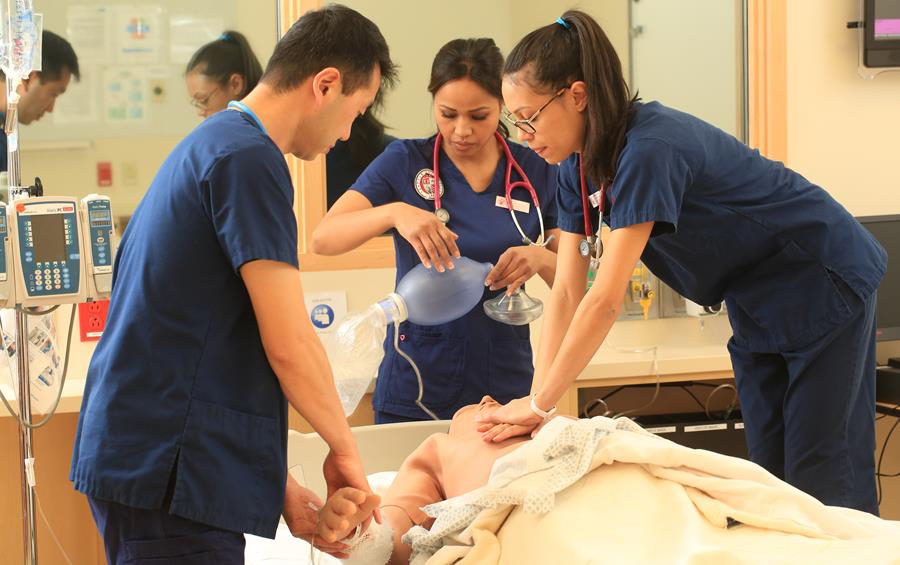
Clinical Performance Lab
Clinical Performance Lab Marks 15th Anniversary with Quick Pivot to Virtual Simulation

Seattle University’s Clinical Performance Lab (CPL), an innovative simulated environment where nursing students practice interventions on high-fidelity manikins, turned 15 this year. An anniversary celebration to recognize student accomplishments made possible by this cutting-edge space was planned by the College of Nursing (CON)–-and cancelled by COVID-19. Concurrently, the pandemic shut nursing students out of clinical placements at area hospitals, clinics and health centers and forced the CPL to close its doors on March 5. CON administrators had to scramble to find a virtual replacement for the experiential learning that happens in the CPL and in clinicals.
Carrie Miller, PhD, RN, director of the CPL, led the charge to identify a solution. With the immediate, generous support of donors, the transition was made in just three weeks and at the start of spring quarter, the CON welcomed students to the world of virtual simulation.
"All of the CPL’s remaining budgetary resources were shifted to purchase virtual simulation technology, which meant planned expenditures to replace non-functioning hospital beds had to be postponed," says Dr. Miller. "It still wasn’t enough."
"We put out a call to our donors and were blessed by their generous immediate response. They contributed $63,000 to help purchase the technology so our students could continue to learn. We couldn’t have done it without them."
Heather Hughes, co-founder of the Sarah M. Hughes Foundation, is one of those donors. "Our team at the foundation has always been supportive of nurses," she says. "Nurses played such a critical role in our lives when our daughter, Sarah, was being treated for pediatric cancer. Whether it was for medical treatment, emotional support or a much-needed laugh, the unwavering care we received from nurses was a gift."
"Nurses are greatly deserving of our appreciation and respect," she continues, "and we at the foundation want to support their formation."
Dave Sabey, CEO and founder of Sabey Corporation and longtime supporter of the CPL and the CON, concurs. "Certainly, nothing is more needed right now than more quality nurses. Because we recognized both the urgency and the enormity of the College of Nursing’s task, our family welcomed the opportunity to help Dean Swanson and her team smooth the transition to a virtual platform. We can all be very proud that Seattle University continues under all this pressure to train and graduate some of best nursing talent in the country."
Dr. Miller researched virtual simulation platforms with the student experience at the forefront of her mind. The technology had to be inclusive, approachable, accessible and seamless for students. It had to enable students to learn and practice essential skills. In virtual simulation, this means critical thinking skills, clinical reasoning and prioritization abilities. Students are unable to perform the tactile interventions that are possible in the CPL simulation lab.
Two platforms were tested during spring quarter and Dr. Miller collected student feedback. The one determined to best meet student needs and to work for faculty continues to be used this fall.
Misty Louie, a transfer student now in her senior year in the CON, describes her experience:
"I had been looking forward to doing my OB clinicals on the labor and delivery floor at Swedish First Hill spring quarter, but those clinicals became eight-hour virtual simulation days with our clinical instructor. In virtual simulation, I would be given very specific scenarios, like a prolapsed cord during labor, and would have to select which steps I’d take to address the situation. If I didn’t get it right, I’d have to repeat the scenario until I really understood what I needed to do. So, it was like a video game, but I had lots of prep before entering that virtual environment.
According to Dr. Miller, students have commented that virtual simulation scenarios enable them to take on leadership roles they could never take on in clinical practice. They learn to identify problems and manage them until the providers come in, which develops their confidence and prioritization skills.
At the start of fall quarter, the CPL was permitted to reopen at 30 percent capacity, enabling students to continue their essential skills training there, and many of the clinical sites have reopened to students for patient-facing practice.
The CPL simulation lab, where high-fidelity "patients" respond to student interventions from drawing blood to delivering a baby, remains closed in accordance with Centers for Disease Control and Prevention (CDC) guidelines. For now, Seattle U nursing students are carrying on with a combination of distance and in-person classroom learning, virtual simulation and face-to-face time in clinical placements. The hope is that the CPL simulation lab can reopen for winter quarter.
One change students will experience when the CPL does fully reopen is a new end-of-life simulation.
"Our new simulation scenario was just published in the November Clinical Simulation Nursing Journal," Dr. Miller says. "Our end-of-life manikin will be a COVID patient. When our students graduate, they will most likely be taking care of COVID patients and they need to be able to cope with the implications of the virus. The patient in the simulation will die, and the students will need a safe place to navigate the emotional aspects of that, which the CPL provides."
"This brings me back to our wonderful donors," she continues. "The CPL was made possible by the Jim and Janet Sinegal Initiative for Nursing Education, which gave the College of Nursing a generous gift to improve access to quality health care. Several of our $40,000 to $80,000 high-fidelity manikins were funded by our donors, as was other equipment in the CPL. I can’t stress enough how deeply grateful we are for their unwavering generosity and support for our students. I hope to come together with these caring individuals one day soon for a postponed celebration of the CPL’s 15th anniversary."
Take a video tour of the CPL https://www.seattleu.edu/nursing/clinical-performance-lab/video-tour/. Support the College of Nursing with an online gift or contact Peggy Fine at finep@seattleu.edu.